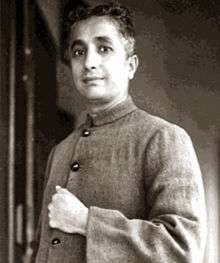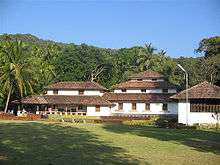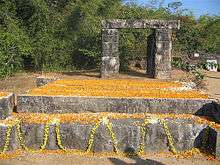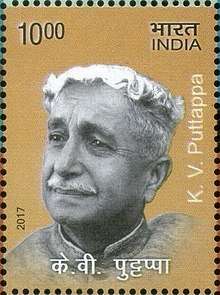Kuvempu
Kuppali Venkatappa Puttappa (29 December 1904 – 11 November 1994),[2] popularly known by his pen name Kuvempu, was an Indian novelist, poet, playwright, and critic. He is widely regarded as the greatest Kannada poet of the 20th century.[3][4][5][2][6] He was the first Kannada writer to be by decorated with the Jnanpith Award.[7]
Kuppali Venkatappa Puttappa | |
|---|---|
 | |
| Born | 29 December 1904 Kuppalli, Shivamogga district, Kingdom of Mysore (now in Karnataka), [1] |
| Died | 11 November 1994 (aged 89) Mysore, Karnataka, India |
| Pen name | Kuvempu |
| Occupation | Poet, novelist, playwright, academic |
| Language | Kannada |
| Nationality | Indian |
| Genre | Fiction, drama |
| Literary movement | Navodaya |
| Notable awards | Karnataka Ratna (1992) Padma Vibhushan (1988) Jnanapith Award (1967) Padma Bhushan (1958) |
| Spouse | Hemavathi (m. 1937–1994) |
| Children | Poornachandra Tejaswi |
| Website | |
| Official website | |
Kuvempu studied at Mysuru University in the 1920s, taught there for nearly three decades and served as its vice-chancellor from 1956 to 1960. He initiated education in Kannada as the language medium. For his contributions to Kannada Literature, the Government of Karnataka decorated him with the honorific Rashtrakavi ("National Poet") in 1964 and Karnataka Ratna ("The Gem of Karnataka") in 1992. He was conferred the Padma Vibhushan by the Government of India in 1988. He penned the Karnataka State Anthem Jaya Bharata Jananiya Tanujate.
Biography
Early life and education

Kuvempu was born in Kuppalli, a village in Shivamogga district of the erstwhile Kingdom of Mysore (now in Karnataka) into to a Kannada-speaking Vokkaliga family.[5] His mother Seethamma hailed from Koppa,Chikkmangaluru, while his father Venkatappa Gowda was from Kuppali, a village in Thirthahalli taluk (in present-day Shimoga district), where he was raised.[8][5] Early in his childhood, Kuvempu was home-schooled by an appointed teacher from South Canara. He joined the Anglo-Vernacular school in Thirthahalli to continue his middle school education. Kuvempu's father died when he was only twelve. He finished his lower and secondary education in Kannada and English languages in Thirthahalli and moved to Mysore for further education at the Wesleyan High School. Thereafter, he pursued college studies at the Maharaja College of Mysore and graduated in 1929, majoring in Kannada.
Family
Kuvempu married Hemavathi on 30 April 1937. He was forced into enter marital life on this faculty out of Ramakrishna Mission. Kuvempu has two sons, Poornachandra Tejaswi and Kokilodaya Chaitra, and two daughters, Indukala and Tharini. Tharini is married to K.Chidananda Gowda the former Vice-Chancellor of Kuvempu University. His home in Mysore is called Udayaravi. His son Poornachandra Tejaswi was a polymath, contributing significantly to Kannada literature, photography, calligraphy, digital imaging, social movements, and agriculture.
Career
Kuvempu began his academic career as a lecturer of Kannada language at the Maharaja's College in Mysore in 1929. He worked as an assistant professor in the Central college, Bangalore from 1936. He re-joined Maharaja's college in Mysore in 1946 as a professor. (group photo) He went on to become the principal of the Maharaja's college in 1955. In 1956 he was selected as the Vice-Chancellor of Mysore University where he served till retirement in 1960. He was the first graduate from Mysore University to rise to that position.[6]
Works and message
Kuvempu started his literary work in English, with a collection of poetry called Beginner's Muse but later switched to his native Kannada. He spearheaded the movement to make Kannada the medium for education, emphasizing the theme "Education in the Mother tongue". To cater to the needs of Kannada research, he founded the Kannada Adhyayana Samsthe ("Institute of Kannada Studies") in the Mysore University, which has since been renamed after him as "Kuvempu Institute of Kannada Studies". As Vice-Chancellor of Mysore University, he pioneered the study of sciences and languages. He championed the publishing of Knowledge for the laymen with by G. Hanumanta Rao.
The speech he made during the convocation ceremony of Bangalore University was published in the book Vichaarakranthige Aahwaana. It calls for a re-assessment of developmental policies. Though it was delivered in 1974, the message is still considered relevant to modern society. In the year 1987, The Government of Karnataka started the Kuvempu University in the Shimoga district, Karnataka. This is located in the Jnana Sahyadri campus, 28 km from Shimoga city.
Bibliography
Epic
- Sri Ramayana Darshanam/ಶ್ರೀ ರಾಮಾಯಣ ದರ್ಶನಂ - Volume-01 (1949), Volume-02 (1957)
- Chitrangada/ಚಿತ್ರಾಂಗದಾ
Novels
- Kaanuru Heggadati/ಕಾನೂರು ಹೆಗ್ಗಡತಿ (1936)
- Malegalalli Madumagalu/ಮಲೆಗಳಲ್ಲಿ ಮದುಮಗಳು [9] (1967)
Plays
- Birugaali/ಬಿರುಗಾಳಿ (1930)
- Maharaatri/ಮಹಾರಾತ್ರಿ (1931)
- Smashana Kurukshethra/ಸ್ಮಶಾನ ಕುರುಕ್ಷೇತ್ರ (1931)
- Jalagaara/ಜಲಗಾರ (1931)
- Raktaakshi/ರಕ್ತಾಕ್ಷಿ (1932)
- Shoodra Tapaswi/ಶೂದ್ರ ತಪಸ್ವಿ (1944)
- Beralge koral/ಬೆರಳ್ಗೆ ಕೊರಳ್ (1947)
- Yamana solu/ಯಮನ ಸೇೂಲು
- Chandrahasa/ಚಂದ್ರಹಾಸ
- Balidaana/ಬಲಿದಾನ
- Kaaneena/ಕಾನೀನ (1974)
Autobiography
- Nenapina Doniyali/ನೆನಪಿನ ದೇೂಣಿಯಲಿ (1980)
Collection of stories
- Sanyaasi Mattu Itare Kathegalu / ಸನ್ಯಾಸಿ ಮತ್ತು ಇತರೆ ಕಥೆಗಳು (1937)
- Nanna Devaru Mattu Itare Kathegalu / ನನ್ನ ದೇವರು ಮತ್ತು ಇತರೆ ಕಥೆಗಳು (1940)
Essays
- Malenaadina Chittragalu / ಮಲೆನಾಡಿನ ಚಿತ್ರಗಳು (1933)
Literary criticism
- Atmashreegagi Nirankushamatigalagi (1944)
- Kavyavihara (1946)
- Taponandana (1951)
- Vibhuthi Pooje / ವಿಭೂತಿ ಪೂಜೆ (1953)
- Draupadiya Shrimudi (1960)
- Vicharakrantige Ahvana (1976)
- Sahityaprachara
- Ithyadi
- Raso Vai Saha
Essay and Other
- Manujamatha Viswapatha
- Kavya Vihara
- Mantramangalya
Biography
- Swami Vivekananda (1932)
- Sri Ramakrishna Paramahamsa (1934)
Translation
- Guruvinodane Devaredege
- Janapriya Valmiki Ramayana
Stories and poems for children
- Bommanahalliya kindarijogi(1936)
- Mari vijnani(1947)
- Meghapura (1947)
- Nanna mane (1947)
- Nanna gopala
- Amalana kathe
- Sahasa pavana
- Modannana Tamma
- Narigaligeke Kodilla
- Haluru
- Panchajanya
- Prema Kashmira
- Anuttara : Premopanisattu
- Kutichaka
Movies
- Kanooru Heggadithi (directed by Girish Karnad).
Drama
- Malegalalli Madumagalu (directed by basavalingaiah)
Awards and honours
- Karnataka Ratna (1992)[10]
- Padma Vibhushan (1988)[11]
- Pampa Award (1987)[10]
- Jnanpith Award (1967)[12]
- Rashtrakavi ("National Poet") (1964)[10]
- Padma Bhushan (1958)[11]
- Sahitya Akademi Award (1955)[10]
- To landmark the golden jubilee of Kannada's first Jnanapeeth award, on 29 December 2017, Kuvempu's 113th birth anniversary, Google India dedicated a Google Doodle in his honor.[13][14]
Memorials
Kavimane — Kuvempu Memorial

The childhood home of Kuvempu at Kuppali has been converted into a museum by Rashtrakavi Kuvempu Pratishtana (a trust dedicated to Kuvempu). This trust has undertaken immense developmental works in Kuppali to showcase Kuvempu and his works to the external world.[15] On 23 November 2015 night, many valuables including the Padma Shri and Padma Bhushan awards conferred on poet laureate Kuvempu were stolen from Kavimane.[16][17][18]
The entire museum has been ransacked. The surveillance cameras there have also been damaged. The Jnanapith award kept there has remained intact..
Kavishaila
The gradually rising hill south of the house is named Kavishaila, Kuvempu's mortal remains were placed at Kavishaila.[15]
Biographies on Kuvempu

- Annana Nenapu, Poornachandra Tejaswi
- Yugada Kavi, K.C. Shiva Reddy
- Kuvempu, Pradhan Gurudatta
- Magalu Kanda Kuvempu, Tharini Chidananda,
Commemoration
The Kuvempu University in Shimoga, Karnataka was established in 1987.[19] The Vishwamanava Express[20] was named in honour of Kuvempu's idea of "Vishwa Manava" ("Universal Man").[21]
India Post honoured Kuvempu by releasing a postage stamp in 1997[22] and 2017.[23]
See also
- Kannada
- Kannada literature
- Kannada poetry
- Rashtrakavi, for a list of poets who have borne that title
References
- "Who is Kupali Venkatappa Puttappa? Know all about Indian novelist honoured by Google through doodle". The Financial Express. 29 December 2017. Retrieved 29 December 2017.
- "The Gentle Radiance of a Luminous Lamp". Ramakrishna Math. Archived from the original on 22 August 2006. Retrieved 31 October 2006.
- "Kuppali Venkatappa Puttappa: Kuvempu's Kannada legacy". www.aljazeera.com.
- "Kuvempu's 113th birth anniversary: Google doodle honours 20th century Kannada poet". hindustantimes. 29 December 2017.
- Rao, L. S. Sheshagiri (2012). Kuvempu. Sapna Book House Pvt. Ltd. ISBN 9788128017933. Retrieved 29 December 2017.
- Bharati, Veena. "Poet, nature lover and humanist". Deccan Herald. Archived from the original on 18 March 2006. Retrieved 2 September 2006.
- "Jnanpith Awards". Ekavi. Retrieved 31 October 2006.
- "After burglary, Kuvempu museum steps up security". The Hindu. 25 November 2015.
- "Malegalalli Madumagalu book PDF Download free". 5 December 2018.
- "Culture p484-485" (PDF). A Handbook of Karnataka. Government of Karnataka. Archived from the original (PDF) on 8 October 2011. Retrieved 10 December 2010.
- "Padma Awards Directory (1954–2009)" (PDF). Ministry of Home Affairs. Archived from the original (PDF) on 10 May 2013. Retrieved 10 December 2010.
- "Jnanpith Laureates Official listings". Jnanpith Website. Archived from the original on 13 October 2007.
- p. m, Veerendra (21 December 2017). "goldenJubliee". The Hindu.
- "googleIndiaTwitter".
- "Where the poet once lived". Deccan Herald. 29 June 2009.
- Correspondent, STAFF (24 November 2015). "Kuvempu memorial ransacked". The Hindhu.
- "Padma Awards, Cash Stolen From magane Memorial". The New Indian Express. 25 November 2015.
- Kumar R B, Santosh (29 June 2009). "Padma awards of renowned Kannada poet Kuvempu stolen". The Indian Express.
- http://www.kuvempu.ac.in/php/about.php
- Vishwa Manava Express hits the tracks. The Hindu (23 May 2017). Retrieved on 2018-11-06.
- 'Vishwamanava Express', and story behind the name. Deccan Herald. 27 May 2017
- Jnanpith Award Winners, Kannada (click for stamp information) ::: 1996-1997 » Commemorative Stamps » Stamps. Indianphilatelics.com (28 March 1997). Retrieved on 2018-11-06.
- Postage Stamps, Stamp issue calendar 2014, Paper postage, Commemorative and definitive stamps, Service Postage Stamps, Philately Offices, Philatelic Bureaux and counters, Mint stamps (unused stamps). Postage Stamps. Retrieved on 6 November 2018.
Further reading
- Gowda, Chandan (12 January 2015). "Shadow on the glen : legendary writer Kuvempu's liberal legacy is revered in Karnataka". Outlook. 55 (1): 74–75. Retrieved 7 January 2016.
External links
| Wikimedia Commons has media related to Kuvempu. |
| Wikiquote has quotations related to: Kuvempu |